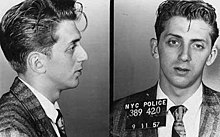Jerry Rosenberg
Jerry Rosenberg | |
|---|---|
 1957 mugshot | |
| Born | Jerome Rosenberg May 23, 1937 |
| Died | June 1, 2009 (aged 72) |
| Other names | Jerry the Jew[1] |
| Criminal charge | Murder |
| Penalty | Death (later reduced to life in prison) |
Jerome "Jerry" Rosenberg (May 23, 1937 – June 1, 2009) was an American convicted murderer. He was incarcerated for 46 years, longer than any other prisoner in New York State history. Rosenberg was sentenced to death for his involvement in a double homicide of two New York City police officers. His sentence was commuted to life in prison to be consistent with laws reducing the use of capital punishment in New York. Rosenberg went on to become the first New York State inmate to earn a law degree and in turn gave legal advice to several inmates, including the leaders of the Attica Prison riot. A book was written about Rosenberg and his time in prison which was adapted into a made-for-TV movie.
Robbery and murder
In 1962, Rosenberg took part in the robbery of Borough Park Tobacco Company in Brooklyn. The robbery was unsuccessful and resulted in the death of two police officers.[2] The previous killing of two New York City police officers had occurred more than three decades earlier. With 1,000 police officers assigned to the double homicide, Rosenberg would eventually turn himself in. Upon conviction of first-degree murder, Rosenberg was to be executed along with his accomplice in the 1962 shooting.[1] Throughout his sentence, Rosenberg claimed to have not been guilty of murder.[1]
Time in prison
In 1964 Rosenberg was to be executed using the electric chair. Shortly before it was to take place,[2] he was granted a stay of execution by Governor Nelson Rockefeller based on new laws that reduced the use of capital punishment in New York.[1] Four years after Rosenberg's incarceration, he earned a law degree from the Blackstone Career Institute.[1] Prior to Rosenberg, no inmate in the state of New York had ever earned a law degree.[2] During the 1971 Attica Prison riot, Rosenberg provided legal advice to those leading the uprising. This included dramatically tearing in half a judge's order, as TV news cameras rolled, because he considered it a fake. In actuality, the authentic order had been procured as a bargaining chip—to protect Attica's inmates from future administrative reprisals if they would return to their cells. Rosenberg was shot in the knee and beaten during the riot, He acted as one of the negotiators for the prisoners before the insurrection ended with an all-out assault by police.[3]
After the riot's resolution, Rosenberg was transferred to Sing Sing Correctional Facility.[1] He frequently assisted other prisoners with legal issues as a jailhouse lawyer and estimated he was involved in over 200 lawsuits.[2][1] Rosenberg was transferred to Wende Correctional Facility in 1991, serving, among other positions within the prison, as paralegal assistant for three years in the law library.[1] Rosenberg was transferred to prison hospital in 2000. He died of natural causes in June 2009 at the age of 72, having served 46 years in state prisons, the longest of any inmate in New York State penal history.[2][1]
In media
Rosenberg was the subject of a 1982 biography by Stephen Bello called Doing Life: The Extraordinary Saga of America's Greatest Jailhouse Lawyer;[4][1] in 1986, the book was adapted for an NBC made-for-TV movie called Doing Life with Tony Danza in the role of Rosenberg.[5]
Notes
- ^ a b c d e f g h i j Chan, Sewell (June 1, 2009). "Jerry Rosenberg, Jailhouse Lawyer, Dies at 72". Region. The New York Times. p. B19. Retrieved June 14, 2016.
- ^ a b c d e Hill, Michael (June 1, 2009). "NY's Longest Serving Inmate Dies at 72". Newsday. Associated Press. Archived from the original on June 5, 2009. Retrieved June 3, 2009.
- ^ Smith 2014, p. 591.
- ^ Bello, Stephen (1982). Doing Life: The Extraordinary Saga of America's Greatest Jailhouse Lawyer. St. Martin's Press. ISBN 978-0-312-21617-7.
- ^ O'Connor, John J. (September 23, 1986). "Tony Danza in 'Doing Life' on NBC". The New York Times. Retrieved June 3, 2009.
Works cited
- Smith, Richard Norton (2014). On His Own Terms: A Life of Nelson Rockefeller. Random House. ISBN 978-0-375-50580-5.
{{cite book}}: Invalid|ref=harv(help)
Further reading
- "Jerry Rosenberg". Law obituaries. The Daily Telegraph. June 15, 2009.
External links
- Doing Life at IMDb
